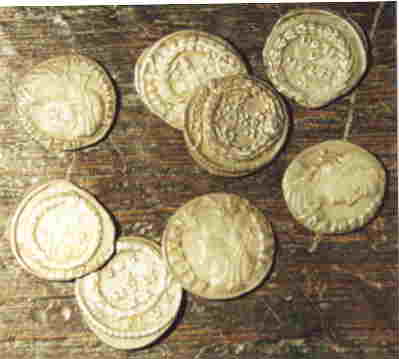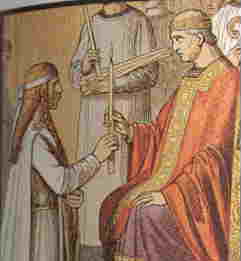|
The History of North Curry |
|
|
From Romans to Saxons
The high ground site of Moredon would have, in early times, stood on a promontary jutting out into the marsh. This commanding place with extensive views may have been the site of a defensive earthwork, below which there may have been a landing place. This small fort may have been linked to a road that ran from the River Axe in Devon through Ilchester to the estuary of the Rivers Tone and Parrett. When the Romans left in the 5th Century the
country's infrastructure was
allowed to decline until the 7th Century when the Saxons arrived and advanced into
Somerset. The Saxon victory at Penselwood in 658 AD opened the way through
forests and marshes to the River Parrett and settlement followed. In 704 King
Ine built a church at Glastonbury, and founded the town of Taunton in 710 AD. At
this time we may be fairly certain there was a Saxon settlement here in
North Curry, when the village contributed its quota of fighting men to the wars
against the Danes.
For more information on the history of North Curry why not buy a copy of "North Curry - A Place in History" by Angela Dix. For details go to http://www.dixuk.com. |
|
 Between 43 AD and 410 AD Britain was occupied by the Romans. We
can be fairly certain of a Roman presence here in North Curry. An urn of 150
Roman coins was unearthed in a field in Lillesdon in 1748. Some of these coins
can be seen in the
Between 43 AD and 410 AD Britain was occupied by the Romans. We
can be fairly certain of a Roman presence here in North Curry. An urn of 150
Roman coins was unearthed in a field in Lillesdon in 1748. Some of these coins
can be seen in the  Each village would have to help feed the King and his court
when they passed to hunt or to war. In the mid 870’s King Alfred hid in
Somerset seeking refuge and made these marshes the basis of his warlike
operations against the encroachment of the Danes. He built a fort at Athelney
and a second at Lyng. King Alfred eventually defeated Danish Guthrum and a peace
treaty was signed in 878 AD. Athelney Abbey was built in 888 AD by King Alfred and
it became closely associated with the people of North Curry. It was dissolved in
1539 but there are many references up to that time in the Wells manuscripts of
various land administrations. A Saxon coin was found in the churchyard of North
Curry some years ago – it can be seen in the
Each village would have to help feed the King and his court
when they passed to hunt or to war. In the mid 870’s King Alfred hid in
Somerset seeking refuge and made these marshes the basis of his warlike
operations against the encroachment of the Danes. He built a fort at Athelney
and a second at Lyng. King Alfred eventually defeated Danish Guthrum and a peace
treaty was signed in 878 AD. Athelney Abbey was built in 888 AD by King Alfred and
it became closely associated with the people of North Curry. It was dissolved in
1539 but there are many references up to that time in the Wells manuscripts of
various land administrations. A Saxon coin was found in the churchyard of North
Curry some years ago – it can be seen in the